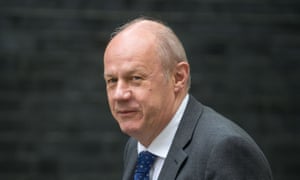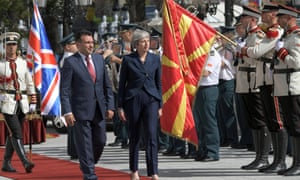Afternoon summary
- Theresa May has said the government is working on a “fallback option” to address the Irish border issue after Brexit. But, speaking at a press conference in Macedonia, she also insisted that the UK would operate “an independent trade policy” from 2021 - even though it has emerged that the fallback option would involve the UK maintaining the EU’s common external tariff for a period after the end of the transition in 2020, which could make implementing new trade deals impossible. (See 5.06pm.)
- John Bercow, the speaker, has allowed an emergency debate to be held on Monday next week about complaints that the government is using a procedural device to block a private member’s bill that would prevent the boundary review reducing the number of MPs from 650 to 600. The Labour MP Afzal Khan requested the emergency debate because his bill is being held up. Many Tory MPs backed him when he first raised this issue last week.
That’s all from me for today.
Thanks for the comments.
Damian Green floats plan to get homeowner pensioners to pay £30,000 each into national care fund
Damian Green, the former first secretary of state, was on the Today programme this morning promoting a plan he has drawn up for a national care fund, to pay for social care. It would everyone having to contribute something - effectively, compulsory insurance - but the key feature of his proposal is to get pensioner homeowners to use equity release to pay for their contributions, unlocking some of the vast wealth tied up in property.
He told the programme:
It’s a staggering amount of money. It is 1.7 trillion of equity owned by over-65s with no mortgage left on their homes. A very small amount of that could solve a lot of this crisis ...
My suggestion would take a very small part of that wealth and leave them significant amounts of money to hand on to their children, because I absolutely accept that inheritance through the generations is important.
Green also said that his proposal was better than the so-called “dementia tax” plan which was widely criticised when unveiled in the 2017 Conservative party manifesto because it would ensure pensioner homeowners were left with a “significant” amount of the value of their property to pass on to their children.
In a speech to an Age UK/Reform conference later he fleshed out his plan in more detail. It would involve pensioners with property having to pay an insurance premium of perhaps £30,000 per head to pay for possible future care. They could obtain the money by downsizing or by equity release, he said. Explaining the advantages, he said:
The £30,000 figure is purely illustrative, and I am conscious of two caveats. One, that government would still need to cover the long tail of the small number who incurred the most costs, and secondly, that those with no equity would still need to be covered by taxation.
But this radical policy would meet some of the most difficult political concerns.
Downsizing and using the capital freed up to buy an insurance policy would still allow the homeowner to pass the full value of their remaining property on to their children.
While equity release schemes would reduce the amount available to pass onto their children, by putting in place a minimum fixed amount that would be inherited, some of the equity in their property would be guaranteed to pass on to their children
Using their own money would enable older people to take greater control over their care options and potentially enable them to choose better arrangements than would be available to people entirely reliant on the state
The options potentially enable people to stay in their own homes longer which is of benefit from a cost and emotional point of view and is shown to improve the length and quality of older people’s lives.
An insurance policy costs money, but it would eliminate older people’s concern that end of life care costs could eliminate all their assets and leave them with nothing to pass on to their children.

Leo Varadkar, the Irish prime minister, has said the UK should table new customs plans within the next two weeks. These are from RTE’s Tony Connelly.
Tony Connelly (@tconnellyRTE)BREAKING: Taoiseach Leo Varadkar says that the British Prime Minister Theresa May shd table a new proposal on the future customs relationship between the EU & UK within the next 2 wks, hints it cd see continued alignment btwn whole of UK and EU on customs into the future
May 17, 2018
Tony Connelly (@tconnellyRTE)the Taoiseach said the prime minister had given him some insights into what he called “new thinking” on the British side.
May 17, 2018
Tony Connelly (@tconnellyRTE)Varadkar: I said to the prime minister that any move that helped to align all of the EU and the UK in terms of customs into the future would be beneficial.
May 17, 2018
Tony Connelly (@tconnellyRTE)“It would help solve some of the problems related to the border but not all of them. It would certainly help us continue to trade between Britain and Ireland much as we do now.”
May 17, 2018
Tony Connelly (@tconnellyRTE)Following a 45 minute meeting on the margins of the EU-Western Balkans Summit, Mr Varadkar warned repeatedly that keeping the UK aligned on customs was not the only thing required to avoid a hard border.
May 17, 2018
Tony Connelly (@tconnellyRTE)Theresa May’s new thinking, he said, was presented “verbally and conceptually” and as such Dublin could not respond until it was presented as a formal written proposal in the Brexit negotiations.
May 17, 2018
Tony Connelly (@tconnellyRTE)Taoiseach said he was “not discouraged”by the meeting.
May 17, 2018
Tony Connelly (@tconnellyRTE)“The PM gave me an insight into some new thinking the UK government as in relation to customs. Obviously we’ll see how that develops. We haven’t been able to get any detail on that yet,but certainly any move on customs that brings the U.K. closer to the EU is to be welcomed.
May 17, 2018
Tony Connelly (@tconnellyRTE)He said he made it clear to the prime minister that Ireland would insist on its red line of a legally operable backstop in the Withdrawal Agreement, whatever progress was made on customs.
May 17, 2018
Tony Connelly (@tconnellyRTE)Asked if the Theresa May could deliver on a new customs relationship given the depths of opposition by hardliners in her cabinet, the Taoiseach said he believed she could, although it involved the “internal politics of the UK.
May 17, 2018
What May said about UK customs plans - Summary and analysis
Here are the main points from Theresa May’s press conference.
- May said the UK would be bringing forward a fresh plan for a Brexit “fallback option” for the Irish border. The original fallback option was set up in paragraph 49 of the joint report (pdf) agreed by the UK and the EU in December. It said:
The United Kingdom remains committed to protecting North-South cooperation and to its guarantee of avoiding a hard border. Any future arrangements must be compatible with these overarching requirements. The United Kingdom’s intention is to achieve these objectives through the overall EU-UK relationship. Should this not be possible, the United Kingdom will propose specific solutions to address the unique circumstances of the island of Ireland. In the absence of agreed solutions, the United Kingdom will maintain full alignment with those rules of the internal market and the customs union which, now or in the future, support North-South cooperation, the all-island economy and the protection of the 1998 agreement.
This afternoon May said that she had had a constructive meeting with the Irish prime minister, Leo Varadkar, earlier today. She went on:
We are working on what our future customs relationship with the European Union will be. In December, when the joint report was published between the European Union and the United Kingdom, we set out clearly options in relation to the commitment that we have given for no hard border between Northern Ireland and Ireland. We expect that to be dealt through the overall relationship we have with the European Union. But there were then two further levels of option, including the final fallback option.
The commission then published a fallback option which was not acceptable to to us. And we will be bringing forward our own proposal for that fallback option in due course.
Her reference to the unacceptable EU proposal was to the draft withdrawal agreement published in February, which defined the fallback in terms of Northern Ireland forming a common regulatory area with the Republic of Ireland - implying a regulatory gap between Northern Ireland and the rest of the UK. This morning it was reported that May will propose keeping the UK bound by EU’s common external tariff for a period after the transition as an alternative fallback position (see 9.24am), and her comment this afternoon was consistent with that being her plan. This would amount to the UK effectively staying in the customs union for longer than planned, although the government would dispute that terminology.
- May said that UK would operate “an independent trade policy” from 2021. Brexiters are opposed to staying in the customs union for any longer than necessary because, although the UK will be free to negotiate trade deals during the transition, it will not be able to implement them until it leaves the customs union at the end of the transition. As my colleague Heather Stewart reports, the proposed new “backstop” plan would involve the UK maintaining the common external tariff for a period after 2020 but opting out of the common commercial policy (which prevents countries negotiating their own trade deals). This afternoon May stressed she was committed to being able to operate an independent trade policy from 2021. She said:
First of all, we are very clear that we will be leaving the customs union. We will be, in future, outside that customs union able to develop our own independent trade policy ...
We are committed, as we leave the customs union and as we look to that future economic partnership, to ensuring that we have a relationship that enables us to have as frictionless trade with the European Union as possible, that we also do [avoid a hard border between Northern Ireland and Ireland] but also that we are able to have an independent trade policy. And that’s what we will be doing and ensuring that at the end of the implementation period - so, as from the end of December 2020 - we will be able to be operating an independent trade policy.
The danger for May is that her two proposals - remaining bound by the common external tariff for a period after 2020, but having an independent trade policy at the same time - will be ruled mutually exclusive by the EU.
Updated
No 10 says EU withdrawal bill will return to Commons before summer recess

Peter Walker
There is some sign of movement in the Brexit legislative logjam, with the news that the EU withdrawal bill, amended by the Lords 15 times, will now return to the Commons for MPs to consider the amendments before the summer recess.
Earlier on Thursday the leader of the Commons, Andrea Leadsom, announced next week’s business, which had no space for the bill – or any news of other Brexit bills.
But Theresa May’s spokeswoman told journalists this afternoon it would return to the Commons “within weeks rather than months” – that is, before the long summer recess, which begins on 24 July. She said:
We are taking time to consider the amendments, and that is what you would expect us to do on an issue so important.
There is still, however, no news on when MPs can expect to again see the Brexit-related trade and customs bills, or any news at all on bills connected to immigration and fisheries.
May says UK will publish its own plan for Brexit 'fallback option' on Irish border
Q: Will the UK have proposals on customs by the end of June?
May says she has a very useful meeting with the Irish PM today. In the joint report in December the UK and the EU set out options for Ireland. Those measures are supposed to be addressed through the UK/EU relationship. There was a fallback option. When the EU turned that into a text, there was a version of the fallback option. May says that was unacceptable to the UK. But the UK will bring forward its own fallback option, she says.
- May says UK will bring forward new plans for a “fallback option” to address the Irish border problem “in due course”.
This seems to confirm the thrust of what the Telegraph and Politico Europe were reporting this morning. (See 9.24am.)
Updated
May says UK will leave customs union and will operate its own trade policy after 2020
Q: Can you assure people there will be no extension to the customs arrangement with the EU after Brexit?
May says the UK will be leaving the customs union.
After that there will have to be customs arrangements in place.
She wants the UK to have as frictionless trade then as possible. She also wants to ensure there is no hard border in Ireland, and to ensure that the UK can have a trade policy.
From the end of 2020 the UK will be able to operate its own trade policy, she says.
- May says UK will leave customs union and will operate its own trade policy after 2020.
Asked about Hungary, corruption and security in the region, May singles out Russia for criticism. She says Russia has been intervening in a number of ways. We saw that in the chemical attack in Salisbury, she says.
She says it is important for countries to come together. That is why the support Macedonia showed after the Salisbury attack was so important, she says.
She says security came up in her talks today with the Macedonian PM.
May speaks about the UK’s links with Macedonia and says Macedonia is an integral part of Europe. She says relations between the two countries are closer than they have been for more than 20 years.
Theresa May's press conference
Theresa May is now holding a press conference in Macedonia.
These are from RTE’s Tony Connelly on the May/Varadkar bilateral in Sofia earlier. (See 10.36am and 11.10am.)
Tony Connelly (@tconnellyRTE)The Taoiseach Leo Varadkar and British PM Theresa May have had a 30 minute meeting in Sofia on the margins of the EU Western Balkans summit in Sofia. I’m told it was “useful but frank”.
May 17, 2018
Tony Connelly (@tconnellyRTE)Both sides set out their perspectives, no breakthrough on the backstop (but none was really expected). Taoiseach warned that time is running out. Hint that UK may bring forward proposals soon, but no info on what they will contain.
May 17, 2018
Updated
Theresa May is now in Macedonia. She is due to give a short press conference at some point after 4pm UK time.






View all comments >